Wondering what a social media consultant’s salary in the United States looks like? You’re not alone.
Whether you’re a social media agency trying to set fair rates, a small business budgeting for marketing help, or a consultant curious about industry standards, it’s good to know what the job pays.
Here’s the scoop: Social media consultants in the US have a range of earnings. But there’s more than just a number involved. Experience, location, and the type of client all play a role in determining social media consultant salary and hourly rates.
This guide includes practical tips for increasing your social media consultant earnings.
Keep reading to get into the details on pay averages, the highest-paying cities, and how to set yourself up to earn more.
How Much Do Social Media Consultants Charge?
The cost of hiring a social media consultant varies widely based on experience, location, and project scope, with the average cost ranging from $1,000 to $10,000 per month for comprehensive services. On average, the hourly rate for a social media consultant ranges from $50 to $250 per hour.
Entry-level consultants or those working with small businesses may charge on the lower end, while highly experienced professionals or specialized experts, like a paid social consultant, can command higher fees.
Paid social consultants specifically focus on managing and optimizing paid advertising campaigns across platforms like Facebook, Instagram, LinkedIn, and TikTok. These specialists typically earn between $65,000 to $95,000 annually, with hourly rates ranging from $75 to $200 depending on their expertise in campaign strategy, audience targeting, and ROI optimization.
For those who prefer a project-based structure, social media consultants typically use pricing models including monthly retainers, project-based fees, and hourly billing, with prices ranging from $1,000 to $10,000 per month, depending on the services offered. When calculated as a US social media consultant salary per month, this translates to approximately $4,125 to $4,750 for full-time consultants. For example, a content marketing consultant’s salary may be tied to deliverables such as social media strategy, content creation, and audience engagement.
Businesses looking to hire a consultant should also consider industry benchmarks. A marketing consulting salary typically ranges from $60,000 to $120,000 annually, while a strategic consulting salary can be significantly higher, often exceeding $150,000. Those with a niche focus, such as an AI consultant’s hourly rate, may charge premium prices due to their technical expertise.
What Is a Social Media Consultant?
A typical social media consultant job description outlines a professional who helps businesses develop and implement effective social media strategies. Their expertise spans content creation, paid advertising, brand positioning, and audience engagement. Knowledge of social media team roles is essential, as many consultants operate their own social media consulting business, working with brands across industries to optimize their online presence.
Beyond social media, consultants may also specialize in related fields such as branding, advertising, and content marketing. For example, a brand consultant’s salary or an advertising consultant’s salary varies based on expertise in crafting compelling brand narratives. Similarly, professionals in engagement-focused roles, such as engagement consultants, often work on strategies to increase customer interaction and loyalty.
For businesses looking to hire a consultant, make sure to evaluate their track record and pricing structure, which typically follows a standard fee structure used by most marketing consultants including hourly rates ($50-$250), monthly retainers ($1,000-$10,000), or project-based fees determined by scope and deliverables. Whether you need a small business consultant salary estimate or insights into a business consultant’s income, understanding the value a consultant brings can help determine the right investment for your company’s success.
What Influences Social Media Consultant Salaries
The salary for a social media consultant or a project consultant isn’t one-size-fits-all. Many factors determine how much consultants can charge or expect to earn. Here’s what makes the difference:
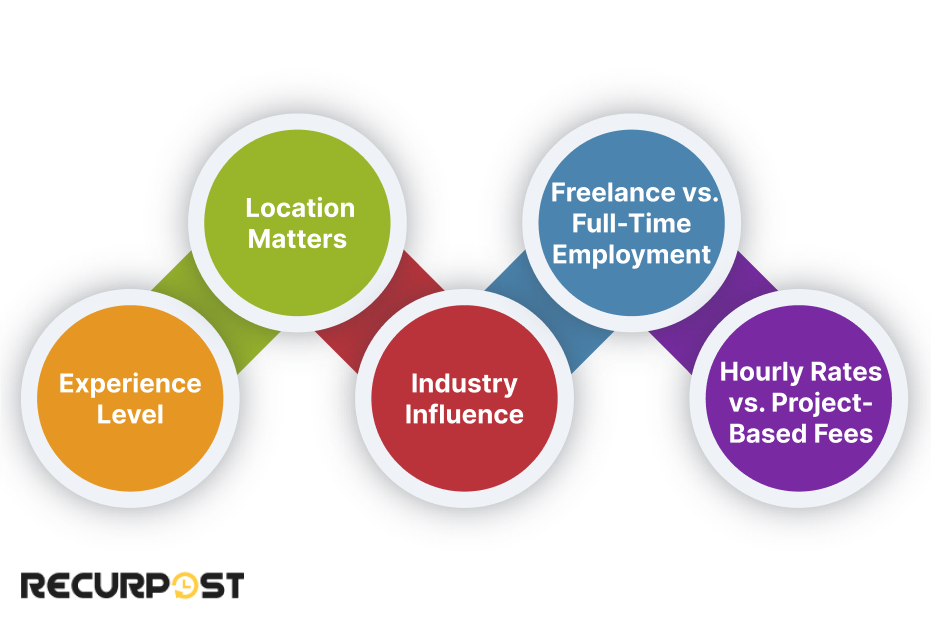
1. Experience Level
- New Consultants: Those just starting out usually earn less, often around entry-level pay, with beginner social media consultants typically charging $20-$30 per hour, while mid-level consultants charge $50-$100 and experts command $100-$250+ per hour. They might charge lower hourly rates until they build a solid portfolio.
- Seasoned Pros: Consultants with a track record of successful campaigns or a specialized skill (like handling crises or social media analytics) tend to command higher rates. Their experience often leads to better pay, whether hourly or through project-based fees.
2. Location Matters
- High-Paying Cities: Places like San Jose, San Francisco, and Washington, D.C., are known for offering higher salaries due to both demand and cost of living.
- Regional Demand: Some cities or states simply have a stronger market for social media experts, making them willing to pay top dollar.
3. Industry Influence
- Top-Paying Sectors: Some industries, like tech, finance, and healthcare, prioritize digital presence and are willing to pay higher for social media expertise.
- Small Businesses vs. Large Corporations: While small businesses often work with smaller budgets, large corporations may offer consultants higher pay to handle complex, high-stakes campaigns.
4. Freelance Social Media Work vs. Full-Time Employment
- Freelancers: Independent consultants often have flexibility in their rates. They might charge more per hour but don’t have the security of regular income or benefits.
- Full-Time Positions: Salaried social media consultants may earn a stable income with benefits, though their hourly rate can sometimes be lower than freelance marketing rates.
5. Hourly Rates vs. Project-Based Fees
- Hourly Rates: Many set an hourly rate for social media consultants to keep it flexible. The social media consultant’s hourly rate varies based on experience, location, and project complexity.
- Project-Based Pricing: Some consultants charge by the project, especially for recurring tasks or campaign work, which clients often prefer for predictability.
These factors set the stage for different pay structures in the field. When pricing their services, social media consultants should consider their experience level, specialized skills, regional market rates, competitor pricing, and the scope of services provided to establish rates that reflect their value while remaining competitive in the market.
Regional Salary Insights for Social Media Consultants
Location significantly affects your social media consultant salary in the US. Some areas are known for higher pay, often due to a combination of demand and cost of living. Here’s how salaries stack up across regions:
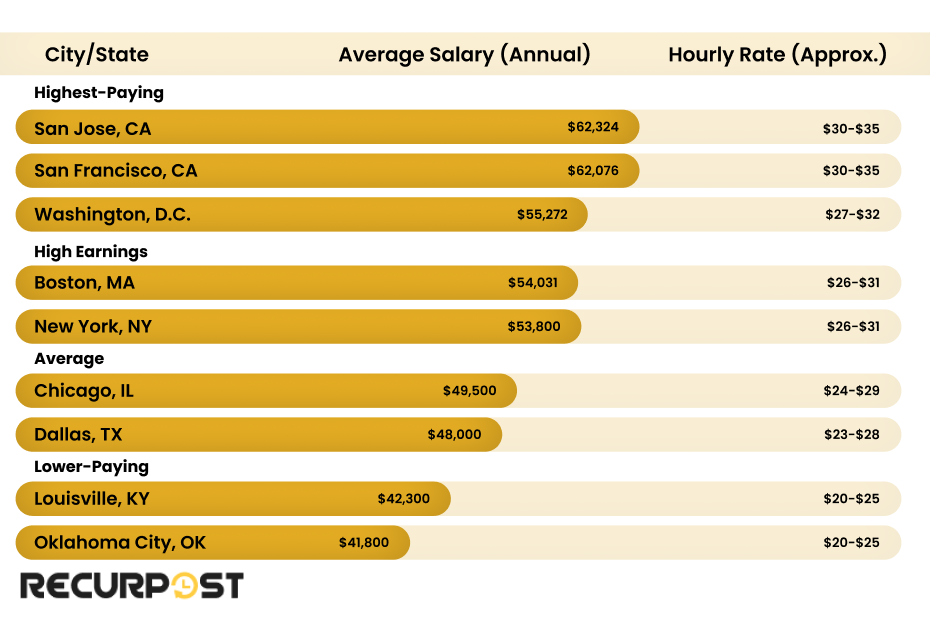
1. Top-Paying Cities and States
- Highest-Paying Cities: Cities like San Jose, San Francisco, and Washington, D.C., typically offer the highest salaries for social media consultants. This higher pay reflects the demand in these areas and the elevated cost of living.
- High-Earning States: States like California, New York, and Massachusetts consistently rank among the top-paying states for social media professionals, especially consultants who offer specialized services.
2. Regional Salary Variations
- Major Metro Areas vs. Small Towns: Social media consultants in large metro areas often earn more than their counterparts in smaller towns. This difference is partly due to the number of businesses willing to invest in online advertising and community engagement.
- Low-Paying Regions: Some areas, particularly rural or low-cost regions, may offer lower salaries. However, the cost of living here is also lower, which can balance things out.
3. Remote Consulting and Flexible Work Locations
- Opportunities for Remote Work: With more companies open to remote work, social media consultants can now work for clients in high-paying regions without physically being there. This flexibility can lead to a better balance of earnings and living costs.
- Benefits of Geographic Flexibility: Remote consultants who charge clients in higher-cost areas may be able to earn a high income while living in lower-cost regions, effectively maximizing their earnings.
Here’s some data on social media consultant salaries by region in the US. This should give you a clear picture of the top-paying locations, along with average salaries,s so you can get a sense of where the best-paying opportunities are.
| Region | City/State | Average Salary (Annual) | Hourly Rate (Approx.) |
| Highest-Paying | San Jose, CA | $62,324 | $30 – $35 |
| San Francisco, CA | $62,076 | $30 – $35 | |
| Washington, D.C. | $55,272 | $27 – $32 | |
| High Earnings | Boston, MA | $54,031 | $26 – $31 |
| New York, NY | $53,800 | $26 – $31 | |
| Average | Chicago, IL | $49,500 | $24 – $29 |
| Dallas, TX | $48,000 | $23 – $28 | |
| Lower-Paying | Louisville, KY | $42,300 | $20 – $25 |
| Oklahoma City, OK | $41,800 | $20 – $25 |
Consultants can use this data to decide where to focus their services or establish their base for remote work.
Hourly Rates vs. Annual Salaries: Which Model to Choose?
Social media consultants must choose between hourly rates and project-based or annual fees, which significantly impact their income. Each payment model offers distinct advantages depending on work type, client needs, and personal circumstances.
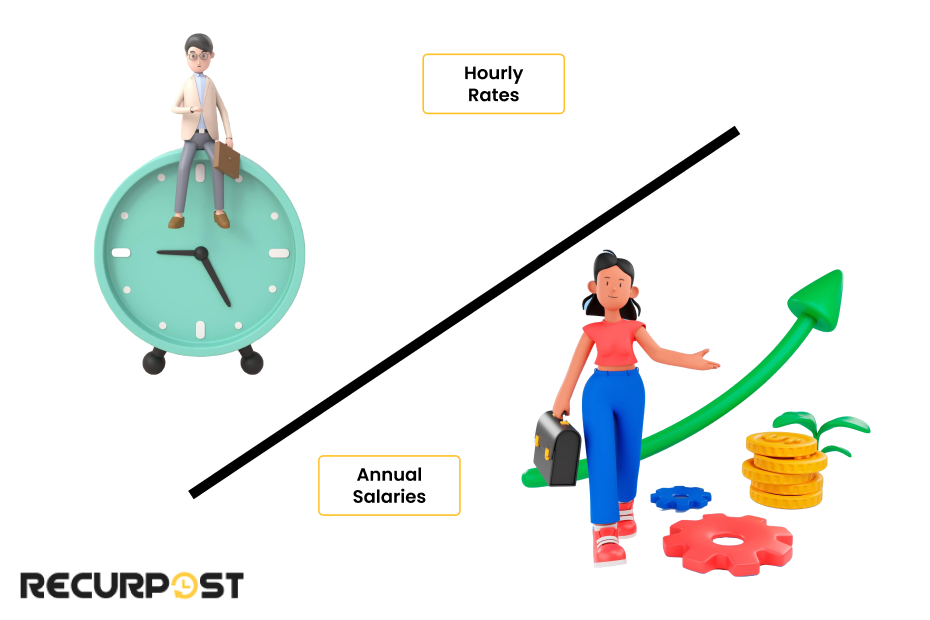
Social media consultants typically offer several pricing models to accommodate different client needs and project scopes:
1. Hourly Rate Packages
- Basic Consultation: $50-100/hour for strategic advice and guidance
- Implementation Support: $75-150/hour for hands-on content creation and posting
- Crisis Management: $150-300/hour for urgent reputation management
2. Monthly Retainer Models
- Starter Package: $1,000-2,500/month for small businesses (includes strategy, content calendar, and basic posting)
- Growth Package: $2,500-5,000/month for medium businesses (adds analytics, audience growth tactics, and paid ad management)
- Premium Package: $5,000-10,000/month for larger companies (comprehensive management with advanced reporting, crisis planning, and multi-platform strategy)
3. Project-Based Pricing
- Social Media Audit: $750-2,000 for a comprehensive analysis of current social presence
- Strategy Development: $2,000-5,000 for a complete social media roadmap
- Campaign Management: $3,000-7,500 for a specific campaign or product launch
4. Performance-Based Components
Some consultants incorporate performance bonuses into their pricing structure, with additional fees tied to achieving specific metrics like:
- Follower growth milestones
- Engagement rate improvements
- Conversion goals
- Revenue generated from social channels
When evaluating social media consultant costs, businesses should consider the value of expertise rather than simply seeking the lowest price. A consultant charging premium rates often delivers superior ROI through a more effective strategy and implementation.
These pricing structures vary based on the consultant’s experience level, geographic location, and industry specialization, with technical fields like finance or healthcare typically commanding higher rates.
Strategies for Boosting Earnings as a Social Media Consultant
You can increase your social media consultant salary, whether you’re new or experienced. Make more by refining your skills, building your reputation, and expanding your client base:
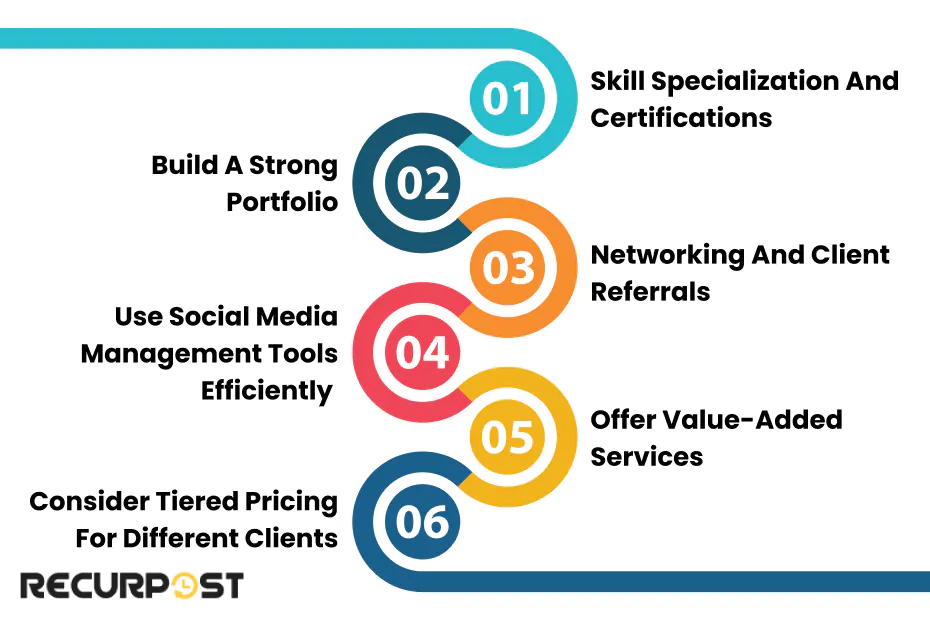
1. Skill Specialization and Certifications
- Niche Expertise: Specializing in areas like analytics, influencer marketing, or social media advertising can make you more valuable to clients, allowing you to charge higher social media consultant rates. Social media manager skills like crisis management or expertise on trending platforms (like TikTok or LinkedIn) can set you apart.
- Certifications that Count: Certifications from Facebook, Google Analytics, or programs like Hootsuite can boost your credibility. Clients often look for consultants who stay current, and these qualifications show dedication to professional growth.
2. Build a Strong Portfolio
- Highlight Successful Campaigns: Showcase previous work that delivered clear results, like increased engagement or a boost in followers. A strong portfolio proves your ability to meet business goals and adapt to client needs.
- Gather Client Testimonials: Positive reviews from past clients can go a long way in justifying higher rates. Even if you’re just starting, ask satisfied clients for a quick testimonial to build your credibility.
3. Networking and Client Referrals
- Industry Connections: Attend conferences, webinars, and events in your field to build a professional network. LinkedIn and other platforms are also great for connecting with other industry experts and potential clients.
- Encourage Referrals: Word-of-mouth referrals are powerful. Let current clients know you’re open to new opportunities and consider offering a referral discount or bonus for clients who bring in new business.
4. Use Social Media Management Tools Efficiently
- Boost Productivity: Tools like RecurPost help you manage multiple clients’ social media profiles in one place. They allow you to automate scheduling, track analytics, and improve overall efficiency.
- Demonstrate Value to Clients: With social media management tools, you can show clients better ROI by maximizing their engagement and reach with less time spent. This justifies higher project or hourly rates.
5. Offer Value-Added Services
- Expand Service Options: Adding services like creating a social media strategy or providing content analysis and monthly reporting can enhance your appeal to clients. Creating a strategy proposal helps you upsell these services, making you a one-stop shop for clients.
- Provide Ongoing Support: Monthly retainers for ongoing support and consultation can create a reliable income stream and help clients stay engaged with your services.
6. Consider Tiered Pricing for Different Clients
- Flexible Packages: Offer different packages that cater to small businesses, startups, and larger companies. Customizing packages based on the client’s needs and budget can make your services accessible to a wider range of businesses.
- Retainers for Long-Term Clients: Many businesses prefer predictable costs, so offering retainer-based services gives them peace of mind and can provide you with steady income.
These strategies can not only help you earn more but also make your services indispensable to clients. You can also read this blog to understand social media marketing packages in detail.
Salary Comparison with Similar Roles in Social Media and Digital Marketing
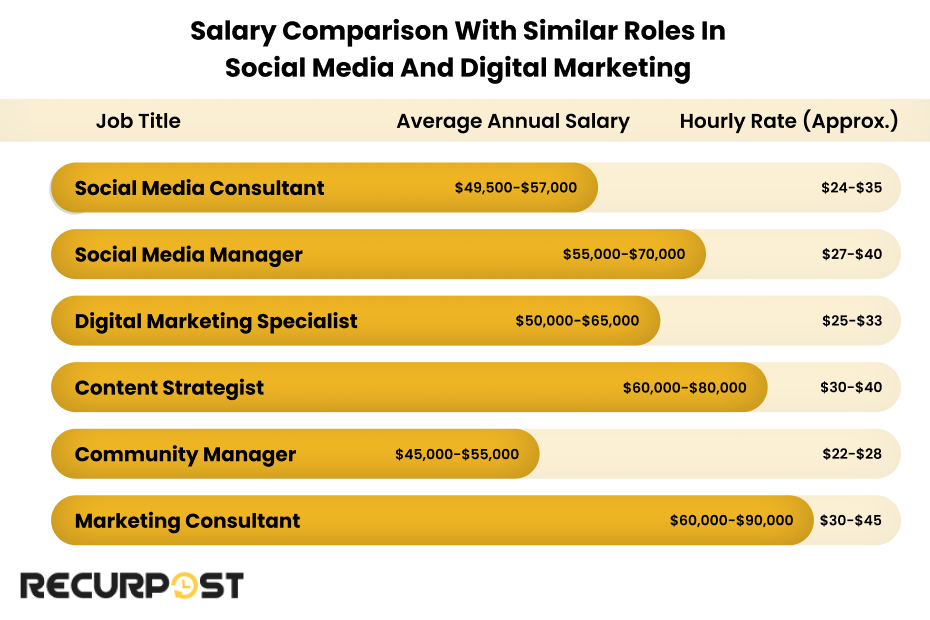
Comparing the social media consultant salary to other roles in digital marketing helps consultants gauge their rates and clients understand typical budgets.
Here’s a breakdown of comparable roles and their average pay in the US:
| Job Title | Average Annual Salary | Hourly Rate (Approx.) |
| Social Media Consultant | $49,500 – $57,000 | $24 – $35 |
| Social Media Manager | $55,000 – $70,000 | $27 – $40 |
| Digital Marketing Specialist | $50,000 – $65,000 | $25 – $33 |
| Content Strategist | $60,000 – $80,000 | $30 – $40 |
| Community Manager | $45,000 – $55,000 | $22 – $28 |
| Marketing Consultant | $60,000 – $90,000 | $30 – $45 |
Key Differences in Responsibilities and Skills
- Social Media Manager vs. Consultant: Social media managers are often in-house employees focused on day-to-day account management, while consultants bring specialized, strategic input on a project or hired as a social media manager on freelance basis, with media consultants generally earning $60,000-$90,000 annually compared to social media consultants’ $49,500-$57,000.
- Digital Marketing Specialist: This role covers broader digital strategies beyond social media, including email marketing, SEO, and online advertising, which often justifies a slightly higher pay rate, with digital media consultants earning $50,000-$65,000 annually compared to social media consultants’ $49,500-$57,000.
- Content Strategist: Content strategists focus on the creation and distribution of digital content and may oversee the larger content plan, influencing brand tone and direction.
- Community Manager: Community managers primarily engage with customers and audiences, moderating social media channels and responding to inquiries, which can overlap with social media consulting business but often at a lower pay rate.
What This Means for Social Media Consultants
- Benchmarking Rates: By understanding where they stand among these similar roles, social media consultants can better determine competitive rates. If they’re offering more advanced strategy services, they may be able to price closer to content strategists or digital marketing specialists.
- Value Proposition: Highlighting specific skills and experience levels can help consultants justify their rates, especially if they bring unique value to clients, such as managing campaigns or providing ongoing analysis.
This comparison serves as a guide for consultants and clients to set realistic salary expectations.
What is a Paid Social Consultant?
Paid social consultants are specialized social media professionals who focus exclusively on creating, managing, and optimizing paid advertising campaigns across social platforms. Their responsibilities include:
- Developing targeted ad strategies across multiple platforms
- Managing advertising budgets and optimizing spend
- Creating compelling ad creative and copy
- Implementing advanced audience targeting
- Analyzing campaign performance and adjusting for maximum ROI
- Staying current with platform algorithm changes and ad format updates
The average paid social consultant salary ranges from $65,000 to $95,000 annually, with experienced consultants in major markets earning upwards of $120,000. Their specialized knowledge of platform-specific advertising tools and analytics typically commands a 15-25% premium over general social media consultant rates.
How to Hire a Social Media Consultant
When looking to hire a social media consultant, businesses should follow a structured approach to find the right professional for their needs. Here’s how to navigate the hiring process:
1. Define Your Social Media Needs
- Assess Current Gaps: Identify specific areas where your social media presence needs improvement, whether it’s content creation, strategy development, or community management.
- Set Clear Goals: Establish measurable objectives for what you want to achieve through social media consulting.
- Determine Budget: Based on the salary ranges outlined earlier, set a realistic budget for the consultant’s services.
2. Evaluate Potential Consultants
- Review Portfolios: Examine past work and case studies to assess the consultant’s style and results.
- Check References: Speak with previous clients about their experiences and outcomes.
- Verify Expertise: Look for specialized knowledge in your industry or the specific platforms most relevant to your business.
3. Interview Process
- Ask About Strategy: Have candidates explain how they would approach your specific social media challenges.
- Discuss Metrics: Determine how they measure success and what reporting you can expect.
- Clarify Communication: Establish expectations for communication frequency and methods.
4. Contract and Onboarding
- Define Scope of Work: Clearly outline deliverables, timelines, and responsibilities in a written agreement.
- Set Payment Terms: Decide between hourly rates, monthly retainers, or project-based fees based on your needs.
- Establish Benchmarks: Create checkpoints to evaluate progress and make adjustments as needed.
When hiring a social media consultant, look beyond just the cost. The right consultant should understand your business goals, demonstrate proven results, and offer a communication style that aligns with your company culture.
Frequently Asked Questions
1. What should social media consultants include in their service packages?
Social media consultants typically offer services including strategy development, content creation, analytics reporting, and audience engagement, with some adding paid ad management or influencer partnerships.
2. How does education impact a social media consultant’s salary?
While degrees aren’t always required, backgrounds in marketing, communications, or business enhance a social media consultant’s value. Certifications and relevant courses can justify higher rates.
3. What’s the difference between a social media consultant and a social media manager?
Social media consultants work primarily on a project basis providing strategic insights, whereas social media managers handle daily account operations and engagement. Consultants develop high-level planning while managers implement and monitor strategies.
4. Do social media consultants get paid more for working with larger companies?
Yes, larger brands with bigger budgets may offer higher pay rates, especially for specialized or ongoing services, compared to smaller businesses with limited budgets.
5. How do social media consultants track their results?
They commonly use tools like Google Analytics, social platform insights, and social media management tools (e.g., RecurPost) for tracking growth, engagement, and ROI on client campaigns.
6. What industries pay the most for social media consultants?
Industries such as technology, e-commerce, and finance often pay the highest rates due to the competitive nature and demand for strong online engagement within these fields.
7. Are there specific tools consultants should be proficient in?
Yes, familiarity with scheduling tools like RecurPost, Hootsuite, or Buffer is key. Analytics tools, such as Google Analytics, also add value by allowing consultants to measure campaign performance.
8. What is a reasonable starting rate for new consultants?
For beginners, a rate between $20-$30 per hour is common. Rates can increase as they gain experience, specialize, and build a client base.
9. How often should consultants review and adjust their rates?
Many consultants review their rates annually, considering factors like experience gained, demand, and market trends to stay competitive and reflect their growth.
10. What does a social media manager do?
Social media managers handle brands’ online presence across platforms by creating content, engaging with followers, and analyzing performance metrics to drive growth and brand awareness.
11. How to List Social Media Marketing Skills in a Resume?
To effectively list social media marketing skills in a resume, include skills like content creation, social media strategy, audience engagement, analytics, SEO, and familiarity with tools like Hootsuite, Buffer, and Canva. Tailor the skills to match the job description where possible.

Saurabh Chaturvedi is a content writer at RecurPost. Specializing in social media management and marketing, Saurabh is dedicated to crafting engaging and informative articles. His passion for clear, exciting content keeps readers eager for more.





